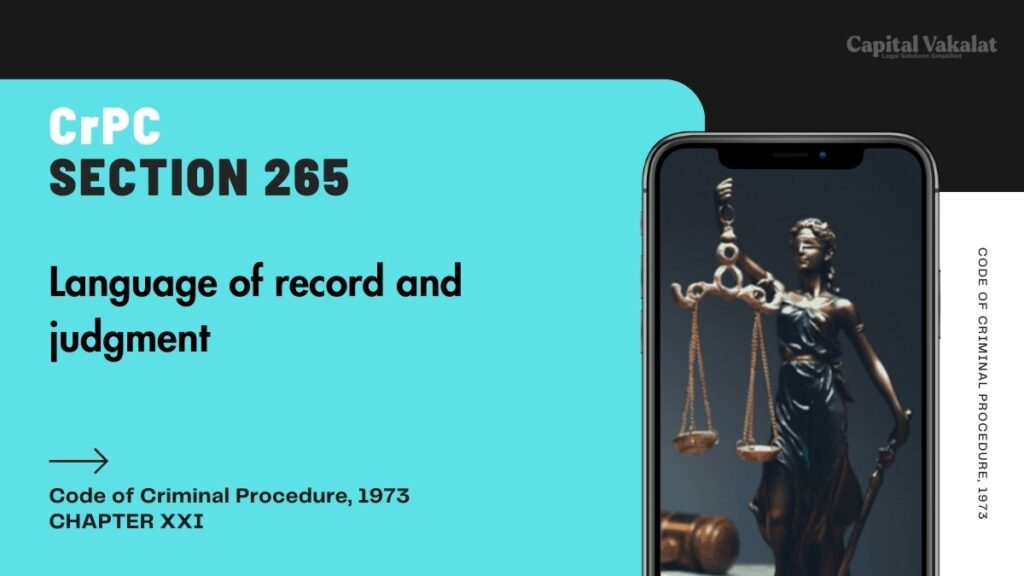Section 265 of the Code of Criminal Procedure (CrPC) in India plays a crucial role in ensuring the transparency and accessibility of the criminal justice process. The provision mandates the use of a particular language for recording evidence and delivering judgments.

This requirement aims to make legal proceedings comprehensible to all parties involved, enhancing the fairness and efficiency of the justice system.
Bare Act. Section 265 Cr.P.C.
Language of record and judgment.
(1) Every such record and judgment shall be written in the language of the Court.
(2) The High Court may authorise any Magistrate empowered to try offences summarily to prepare the aforesaid record or judgment or both by means of an officer appointed in this behalf by the Chief Judicial Magistrate, and the record or judgment so prepared shall be signed by such Magistrate.
Understanding Section 265 CrPC
Section 265 CrPC specifies the language in which records and judgments must be maintained in criminal courts. This section emphasizes the importance of using a language that is understood by the accused, witnesses, and other stakeholders in the judicial process. By doing so, it upholds the principles of natural justice and ensures that the rights of the accused are protected.
Historical Context of Section 265 CrPC
The evolution of Section 265 CrPC can be traced back to the colonial era when the British administration established the Indian legal framework. The provision was designed to bridge the linguistic gap between the legal system and the general populace. Over the years, it has undergone several amendments to adapt to the changing linguistic landscape of India.
Legal Provisions Under Section 265 CrPC
Section 265 CrPC mandates that the record of evidence, judgments, and orders must be in the language of the court. If the language is not understood by the accused, a translation must be provided. This provision ensures that the accused is fully aware of the proceedings and can defend themselves adequately.
Language of Record
The language of the record refers to the language in which all court documents, including evidence, are maintained. This is crucial for ensuring that the legal process is transparent and that the accused can understand the charges and evidence against them. The choice of language can vary depending on the region and the linguistic preferences of the court and the parties involved.
Language of Judgment
The language of the judgment is equally important, as it must be understood by the accused and other relevant parties. This ensures that the judgment is communicated clearly and that the reasoning behind the court’s decision is transparent. Providing translations of judgments, when necessary, further upholds the rights of the accused.
Implications for the Accused
For the accused, the language of record and judgment is critical for understanding the legal process and preparing an effective defense. If the proceedings are conducted in a language they do not understand, it can lead to a miscarriage of justice. Section 265 CrPC addresses this by mandating translations and ensuring that the accused is fully informed.
Challenges in Implementation
Despite the clear provisions of Section 265 CrPC, there are practical challenges in its implementation. These include the availability of qualified translators, the diversity of languages spoken in India, and the need for consistent application across different regions. Addressing these challenges requires a concerted effort from the judiciary, legal professionals, and government authorities.
Judicial Interpretations of Section 265 CrPC
The judiciary has played a significant role in interpreting Section 265 CrPC to ensure its effective implementation. Several landmark judgments have emphasized the importance of using a language that the accused understands. These interpretations have reinforced the provision’s intent to protect the rights of the accused and uphold the principles of natural justice.
Case Studies
Examining case studies where Section 265 CrPC has been applied can provide valuable insights into its practical implications. For instance, cases where the accused did not understand the language of the proceedings highlight the importance of accurate translations and the need for vigilance in upholding this provision.
Best Practices for Legal Professionals
Legal professionals, including judges, lawyers, and court staff, play a crucial role in implementing Section 265 CrPC. Best practices include ensuring timely translations, maintaining clear communication with the accused, and regularly updating language proficiency to cater to the diverse linguistic needs of the parties involved.
Future Directions
As India continues to evolve linguistically and culturally, the provisions of Section 265 CrPC may require further amendments to stay relevant. Future directions could include leveraging technology for real-time translations, enhancing language training for legal professionals, and promoting awareness of linguistic rights within the legal system.
Conclusion
Section 265 CrPC is a vital provision that upholds the linguistic rights of the accused and ensures the transparency of the legal process. By mandating the use of a comprehensible language for records and judgments, it protects the principles of natural justice and enhances the fairness of the criminal justice system. Addressing the challenges in its implementation and exploring future directions will further strengthen this provision and uphold the rights of all parties involved in the legal process.